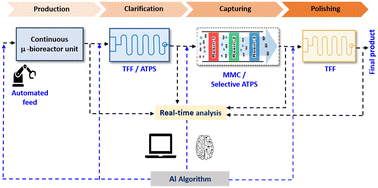Biopharmaceuticals have emerged as powerful therapeutic agents, revolutionizing the treatment landscape for various diseases, including cancer, infectious diseases, autoimmune and genetic disorders. These biotherapeutics pave the way for precision medicine with their unique and targeted capabilities. The production of high-quality biologics entails intricate manufacturing processes, including cell culture, fermentation, purification, and formulation, necessitating specialized facilities and expertise. These complex processes are subject to rigorous regulatory oversight to evaluate the safety, efficacy, and quality of biotherapeutics prior to clinical approval. Consequently, these drugs undergo extensive purification unit operations to achieve high purity by effectively removing impurities and contaminants. The field of personalized precision medicine necessitates the development of novel and highly efficient technologies. Microfluidic technology addresses unmet needs by enabling precise and compact separation, allowing rapid, integrated and continuous purification modules. Moreover, the integration of intelligent biomanufacturing systems with miniaturized devices presents an opportunity to significantly enhance the robustness of complex downstream processing of biopharmaceuticals, with the benefits of automation and advanced control. This allows seamless data exchange, real-time monitoring, and synchronization of purification steps, leading to improved process efficiency, data management, and decision-making. Integrating autonomous systems into biopharmaceutical purification ensures adherence to regulatory standards, such as good manufacturing practice (GMP), positioning the industry to effectively address emerging market demands for personalized precision nano-medicines. This perspective review will emphasize on the significance, challenges, and prospects associated with the adoption of continuous, integrated, and intelligent methodologies in small-scale downstream processing for various types of biologics. By utilizing microfluidic technology and intelligent systems, purification processes can be enhanced for increased efficiency, cost-effectiveness, and regulatory compliance, shaping the future of biopharmaceutical production and enabling the development of personalized and targeted therapies.
